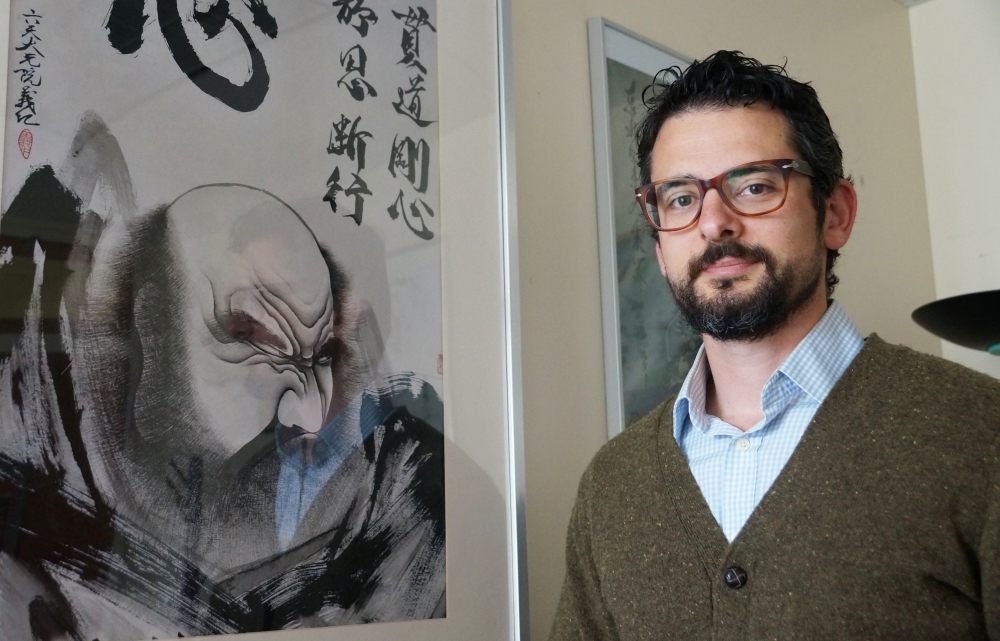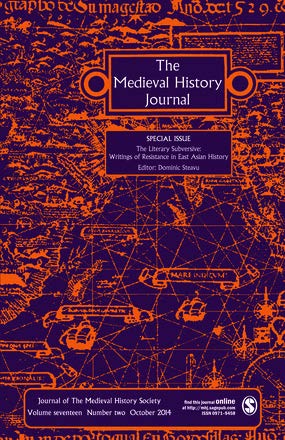
Writings of Resistance

When the Medieval History Journal, a prestigious scholarly publication, sought to expand its coverage of topics related to East Asian medieval history, the editors looked to UC Santa Barbara’s Dominic Steavu.
And for the first time in the flagship journal’s nearly 25-year history, an entire issue is devoted to East Asia, and more specifically to the roles of intellectuals in social and political domination/hegemonic ideologies. The result is the recently published issue, “The Literary Subversive: Writings of Resistance in East Asian History.”
Challenging Western theories of the role of intellectuals, the essays in the volume offer a range of East Asian perspectives, according to Steavu, an assistant professor in UCSB’s Department of East Asian Languages and Cultural Studies and Department of Religious Studies. “I wanted to look primarily at how intellectuals conceive of themselves as an integral gear in the mechanism of social contestation and, eventually, instigating some kind of change in the social and political order,” said Steavu.
His focus is not on the agency of academics or intellectuals historically as a group — we’re talking about the medieval period in China — or the ways in which they individually contributed to shaping their destinies through concrete actions, Steavu explained. Rather, he wanted to explore how they could, through their writings, as individuals or a community indirectly engage with certain issues in a way that might result in measurable and tangible change.
“But it wasn’t overt or direct critique of the government or administration that was in place,” he noted. “I was more interested in the genres that would circumvent that very political or social critique that you find in almost every tradition and every culture.”
He began his own investigation with a study of Antonio Gramsci, the Italian Marxist theoretician and politician who wrote about the role of the intellectual in revolution, and how the intellectual is an integral part of the mechanisms of change in a social context. “I wanted to look at how his ideas would play out in an East Asian medieval historical context,” Steavu said.
He used Gramsci’s perspectives on the intellectual as a springboard but established that indigenous traditions of progressive social thought and resistance in East Asia come with their own theoretical framework that are not only independent of continental post-enlightenment theories, but also are just as sophisticated and in fact better suited to shed light on non-Western sources.
“I also make the point that looking at pre-modern Chinese writings and calling them ‘anarchist,’ for example, is taking a Western term and applying it to something that has nothing to do with Western historical experience. The Chinese had their own terms to qualify resistance that were precursors to 18th- and 19th-century development of anarchism in Europe,” explained Steavu. “And these precursors should be taken seriously and in their own right as mature intellectual, political and social theories of contestation.”
Among other contributors to the journal issue is Fabio Rambelli, who holds the International Shinto Foundation Chair in Shinto Studies at UCSB. Rambelli, who is also chair of the campus’s Department of East Asian Languages and Cultural Studies, has expertise in Japanese religions and intellectual history, Buddhism, Shinto and semiotics, the philosophical theory of signs and symbols.
Steavu’s area of specialization is Chinese religions, with a focus on the Esoteric Buddhism and Taoism. A recurring theme in his research is the circulation of knowledge across what are often imposed or imagined discursive boundaries — between Taoism and Buddhism, for example, or between religion and science, medicine, or statecraft.
“I’m interested in, among other things, the notion of utopia and the idealized state in early and medieval China. Taoist materials in particular place an emphasis on building utopia not through forward progress and development, but through a retrogressive effort that aims to actualize an imagined bygone golden age,” he said.
“Most interestingly, this is accomplished without bloodshed,” he continued, “but working from within the existing social and political structures to gradually reduce their impact and dismantle them. In a way, this is the opposite of Western notions of ‘revolution.’”
Steavu, who completed his doctorate at Stanford University, began his undergraduate work as student of French literature. He changed majors, however, after spending three months in China and finding the country and “all its contradictions very enthralling.”



